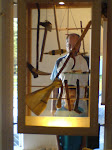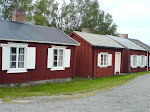Jag brast i skratt i totalförvåning och överraskning igår över en minister som berättade om en åtgärd de vidtagit (tyckte att det var så absurt?). Kommer inte ihåg vad den handlade om (det händer så mycket nu!). Men den handlade om någon förändring eller försämring – igen! Och det var en redan svag grupp som drabbades – igen.
Budskapet är – igen:
”Vi gör det för deras (ert) eget bästa!”
Av omsorg om dem (er), ja! Och folk borde vara extremt tacksamma!!??
Och Helle Klein har skrivit en jättebra och tänkvärd krönika som jag vill tipsa om, nämligen "24-timmarssamhället hotar vår mentala hälsa".
Och jag kommer att tänka på ett bud som inte alls är hedrat idag, nämligen ”Tänk på vilodagen så att du helgar den”. Det budet kanske vi borde återupprätta.
Tillägg om fler artiklar: "Lättare få hjälp med psykisk ohälsa" ut Borås tidning och "Frisk personal ger högre lönsamhet" ur LO-tidningen.
Och ledare av Sofie Wiklund i DD om kulturfestivalen "Slaggsten, Slaveri och Brännvin" om att kunna göra något, ha kul, utan alkohol. Det fanns en artikel inne i tidningen som handlade om värdldsarvets baksida, anordnad till minne av dem som jobbade i Falu gruva och deras anhöriga. Man söp helt enkelt för att orka med. Arbetet i gruvan var otroligt hårt och farligt.
"När det handlar om kulturen kring gruvan visas ofta bara en positiv och ljus sida"
som någon sa i artikeln om hur det var då. Och vidare om hur det är idag: "Kapitalet vill göra oss till enfaldiga konsumenter som gärna bara konsumerar samma sak, för då blir det lättare att sälja."
Det är ju också något som har ändrats i kulturlivet, inte minst musiklivet: på konserter idag ska man kunna ta ett glas vin i pausen. Så var det inte för 30 eller ens 20 år sen...
Använder vi alkohol på liknande sätt som dessa gruvarbetare för länge sen för att kunna hantera våra (hårda, omänskliga) liv? fick det mig att undra.
Jag har utvecklat detta ovan ännu mer nedan på Eneglska!!!
-//-
I couldn’t help laughing in total surprise and astonishment yesterday, thought the statement was so absurd, when one of our ministers in the news told about a new measure the government has taken. There happens a lot now. They are working hard to change everything, and change it so completely so it will be difficult to change things back after their four years in power.
It was about deterioration, one in a long row – again! For an already weak group – again!
The message is – again: “We are doing this for their´(your) own good!”
Of care for them (you)! And people shall be extremely grateful and thank them!!?? Because this is really for their/our best! A best they/we don't know ourselves!???
And I also tipped about a female journalist who has written a great chronicle wort considering; "The 24-hour society is threatening our mental health".
About being "connected" all the time, being in access always. The borders between work and free time, between work and home, are long ago canceled or neutralized. The whole pattern is changed. 30 years ago everything was structured. One knew when a TV-program started and ended, one knew when everything started and ended. Our whole life-rhythm is disturbed.
All changes in work life, slimmed organizations and higher demands has changed the life puzzle. many have difficulties finding relaxation and recovery. Today more than 2 million people over 18 years have sleeping disturbances in a population of 9 million in total (including children). And the consumption of sleeping pills is enormous.
"When teenagers are remitted (referred) from school health care for sleeping problems then it is really creepy"
a female chief physician, neurologist, here says. She has seen the sleeping problems increase during the last 30 years.
And burn out is connected to lack of sleep which in turn has its roots in stress.
The art is probably about being present, being here and now... Many of us should need and benefit from a mental on-and-off-button.
In the religious world they have used meditation, the retreat and the prayer... But meditation as tradition was lost for some decades, but has now, since a decade I think, come back in the Swedish church!!
And I came to think about the command about remembering the Sabbath-day - to hold it holy. Maybe we should restore this command...
See earlier blog posts: here and here. These are things I have to remind myself about I think...
I also came to think what a Swedish psychotherapist Lena Nevander Friström writes in her book "Fångad av arbete, svårt att säga nej, hög sjuknärvaro, inbillningsfrisk - om arbetsnarkomani och behovet av balans" ISBN 91-27-07229-0 about people caught by work, with what she calls work-addiction, difficulties to say no, high sick presence as she calls it, suffering from imagined healthiness (not imagined sickness!!!) the need for balance.
She means we can react in two main ways when we are exhausted or even burn out (for simplicity!?). One is to turn totally insensitive to the surrounding, almost in psychopathic way, with a very contemptuous view on man (and in the bottom probably on yourself). These are often what we would "label" as A-people and they suffer from the illness that everything shall go so fast, they are extremely aggressive and hostile and thus not so fun to have to do with when they get stressed or tired or exhausted.
An extreme A-type behavior is though not so common, but this sort of people are increasing in the world (why do we have to be so clever and why do more and more people have to be so clever? What are we living on this earth for? But I am also the sort of person which is very interested in what I do) . It has shown that this sort of people had a "difficult" childhood the researcher Alexander Perski, mentioned below, in fact writes!!! Parents seriously betraying their children, who drinks, or disappears or get sick Or these adults experienced an extreme form of conditional love and very high demands from their parents when they were small and grew up!!!
The stress-researcher mentioned above, Alexander Perski writes in his book"Out of Balance" ("Ur balans" ISBN 9185015008 in Swedish) about another type of behavior they have found on top of the A- and B- type. Namely one they call the D-type. These people don't react with aggressiveness but with depression. And not with hostility against the environment either? They try and try and try to make a good job, the best possible without getting really angry??
But he writes that neither a negative view on life nor social inhibition in itself doesn't increase the risk for stress diseases!
And Perski also underline the importance of having forums in which you can express yourself!! Where you can canalize tensions, fears or experiences of threat. This apparently functions as lightning-conductors! Gives one perspective on ones situation and better proportions on things; when we are allowed to resonate ourselves forward and use our intellectual resources to solve problems. Others can also contribute with their views... This is not only about contact with others, but also about contact with oneself/yourself! If the talking partner is a good talking partner!!??
Tips about two more articles: about that it is easier to get help with psychic un-health (I don't know the proper English word, ohälsa in Swedish), more and more people don't feel well psychologically, more feel anguish, and more suffer from social phobias, but people today tend to seek help more than before, one talk more openly about these things in society today. And the other was about that a staff which is healthy gives higher profitability to the company or work place, people make a better job and more productive (in a healthy way?).
And there was a leader and article in the local newspaper today about a culture festival, about the dark sides of the World Heritage round the copper mine in Falun. This life is often painted fairly rosy, but the truth is that this life was extremely hard and dangerous for the workers and their families for many, many hundred years (this mine has existed for 1,000 years I think). To cope with it the miners drank a lot of Scandinavian vodka (brännvin in Swedish), and they were also paid with brännvin I think on top.
A man says:
"When one talk about the culture around the mine one often show a positive and bright side of it!"
The leader writer, only 26 years I think, reflected on the customs among Swedish people, that they (we!??) can't have fun without alcohol... And people say things they would never have said without alcohol in the body...
The man interviewed says further:
"The capital wants to make ("transform"? :-)) us to silly consumers, who readily consumes just one thing [alcohol??] , because then it [this stuff?] gets easier to sell"!! [??]
And this festival wanted to prove that it is actually possible to have fun without alcohol. :-)
20-30 years ago it wasn't customary with wine in the pauses at concerts as it is today struck me when I read this...
Do "we" use alcohol in a similar manner as these miners did long ago, to be able to cope with our lives, I suddenly came to wonder??? These miners was that time's "slaves". They had no options to earn their living!? Are we this time's slaves???
And, yes, what has happened on ourchildhood, to come back to that, was it for people's own good??? :-) Quite ironically! Almost as the politician which this blog post started with!??? I didn't think of this connection when I wrote this blog post!!





























